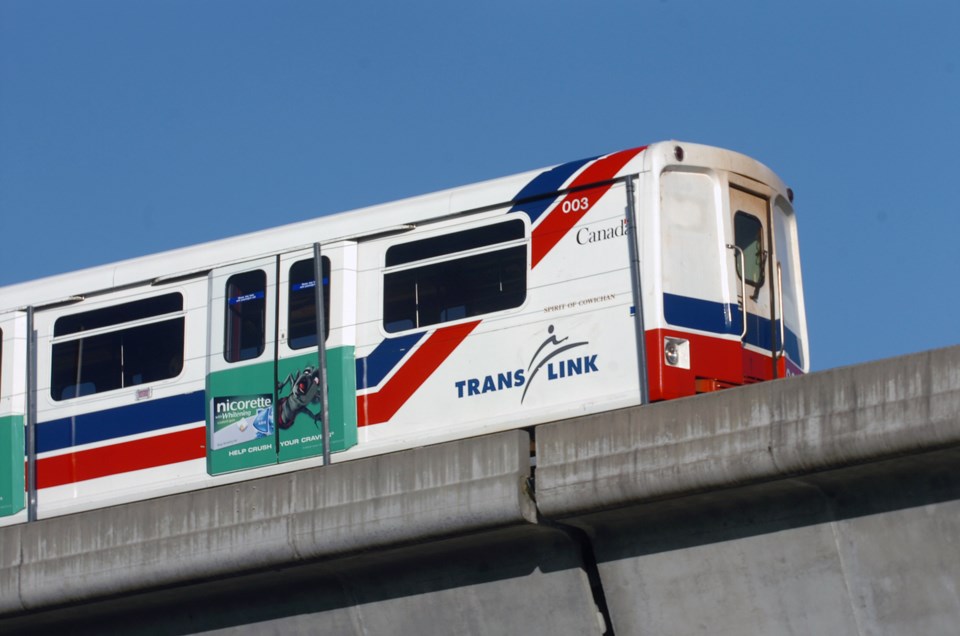New Westminster residents helped send the proposed congestion improvement tax down in flames, but were more supportive of the proposals than many neighbouring municipalities.
Elections B.C. announced Thursday that the final results showed 61.68 per cent of valid votes were No, compared to 38.32 per cent for the Yes side. All totalled, 1,56 million registered voters in Metro Vancouver cast votes in the plebiscite, which is 48.64 per cent of registered voters in the region.
“Unfortunately for the region, for air quality, for people needing to get to work, that was lost,” said Coun. Chuck Puchmayr. “It is a real missed opportunity.”
In New Westminster, 23,371 valid votes were cast in the mail-in transportation and transit plebiscite, with 54.55 per cent voting No and 45.45 per cent voting Yes. While the majority of New Westminster voters opposed the tax, support was greater than in many Metro Vancouver communities.
“I thought New Westminster would be a little bit higher,” Puchmayr said. “I actually thought we would be over the top. I said from the onset if this was a really close race, I was thinking it could be won or lost here in New Westminster.”
Elsewhere, support for the congestion improvement tax ranged from a high of 61.92 per cent in the Bowen Island Municipality to a low of 22.97 per cent in the City of Maple Ridge.
“I think certainly looking at the region, New Westminster residents had the second highest of the major municipalities in terms of support for the referendum. I think that’s reflective of the fact New Westminster understand the importance of public transit in our transportation system, but also that we are a municipality that has so many transportation challenges and recognizes that ignoring the issue isn’t going to solve anything,” said Mayor Jonathan Cote. “I think those are reasons why New Westminster was more included to support it, but in the end, just like every municipality across the region, there was too much to over-come in terms of frustration with TransLink.”
Metro Vancouver were asked whether or not they’d support the Mayors’ Council on Regional Transportation’s request for a 0.5 per cent increase to the provincial sales tax to generate funding to expand the regional transit and transportation system. The mayors’ council planned to use the tax to fund a wide range of transportation and transit initiatives, including a new Pattullo Bridge, upgrades to the major road network, increased capacity of Expo and Millennium SkyTrain lines, increased bus service, additional HandyDart services, cycling and pedestrian improvements, light rail in Surrey and an extension of the Millennium Line along the Broadway corridor in Vancouver.
In June 2014, the mayors’ council announced a 30-year vision for addressing transportation and transit needs in the region. Estimated to cost $7.5 billion, the plan would require some funding from federal and provincial governments, but would also require an additional $285 million annually for the region’s share.
“The mayors’ council is very limited in terms of what they can do. I know the government wants them to look at property taxation. There’s always talk that that there are other forms of revenue. That’s the last thing we need to start using property taxes to fund transit. There’s already a rider on properties for transit,” Puchmayr said. “That was a very creative solution using a one-half per cent increase throughout the region. How people didn’t see that really is disappointing.”
Many of the people who indicated they would be voting No have expressed concerns about TransLink’s governance and management of issues such as the compass card and executive salaries.
“The alleged abuse at TransLink is what got people angry. That was what clearly won the campaign. It was a very sophisticated campaign they advanced,” Puchmayr said. “They made it appear that it was a very grassroots campaign but it really wasn’t. It was purely an attack on any type of transit for people and it’s badly needed.”
Puchmayr said the province has created “an absolute boondoggle” with its handling of the region’s transportation governance, by creating an appointed board.
“The provincial government truly needs to wear a lot of this. It’s the provincial government that appointed the TransLink board, took it away from the elected officials. Now they come back and are asking elected officials what to do,” he said. “It’s sort of a knee-jerk governance direction they have taken.”
While the No campaign sought to appear to be a very grassroots campaign, Puchmayr believes there are “some very significant players” involved behind the scenes.
“I did not for a minute think that we won this one,” he said. “It was a very sophisticated No campaign, similar to many of the anti-transit and anti-rail plebiscites in the United States.”



